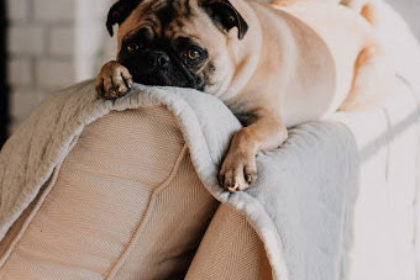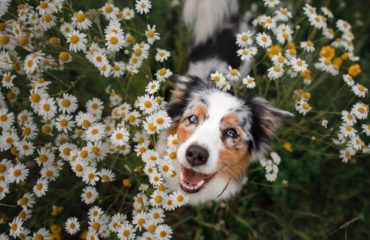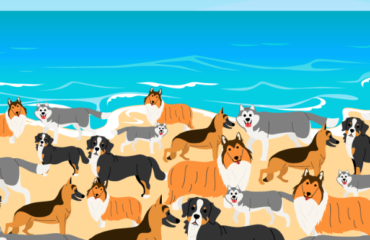How To Stop Your Dog Chewing Their Paws

Dogs chewing their paws is a common behaviour – it can be likened to a human scratching their hand. Nevertheless, persistent and consistent paw chewing could be a sign of health problems. If you have concerns about your dog’s itchy paws, you should contact your vet to err on the side of caution.
Puppies start chewing from a young age due to toothache when their adult teeth are developing, chewing also allows them to explore the world through taste. Older dogs may continue chewing as a way to clean their teeth and strengthen their jaws.
Common reasons why dogs chew their paws include; cleaning, scratching, boredom, allergies, a bug bite or a skin infection. This blog will break down each common cause of dogs chewing paws and how to alleviate the need to chew.
Why Do Dogs Chew Their Paws?
Cleaning
One of the most common reasons why your dog could be chewing his paws is to clean them. We humans have the luxury of washing our hands frequently throughout the day, unlike our four-legged friends.
The anatomy of a dog paw is primarily made up of three sections; the digital pads, metacarpal pad and nails. Between the digital and metacarpal pads, there are areas covered in fur that attract dirt and dust, which can be uncomfortable for dogs, causing them to chew on their paws.

Scratching
Dogs get itches all over their bodies, especially on their paws as they have the most contact with the ground. The behaviour of scratching for a dog is similar to that of itching the hand of a human.
When a dog scratches continuously for any amount of time, it could be an indication that there are parasites such as ticks or fleas on the dog, especially during the summer months.
You can reduce the risk of parasites infecting your dog by doing a few things. You should keep your dog’s main outdoor area free of faeces to help prevent parasites. Regular grooming, whether at home or at a groomer, can also help reduce parasites.
Dogs can be protected against parasites with spot-on treatments and collars that prevent ticks and fleas from encroaching.
Our kennels and dog shelters are designed to give your pup a peaceful place they can call their own, with high-quality materials used to ensure their home is protected from rot, fungus and insect attack. Alongside regular grooming, keeping their kennel and outside space clean helps reduce unnecessary chewing and scratching.
Boredom
Dogs can pick up bad habits frequently if they don’t have enough entertainment. Keeping your dog mentally stimulated is just as important as keeping them physically fit.
There are many symptoms of boredom in a dog such as barking, pacing and chewing. In order to alleviate boredom in your dog, keep their brains engaged by providing them with brain training games.
One fun game you could play with your pup is adding small treats to a towel, rolling it up and then tying it in a loose knot. Allow the dog to untie the knot and unravel the towel to reveal the treats, this creates a long-term activity for the dog to help reduce their boredom.
Allergies
Allergies can also cause a dog to excessively chew their paws. Environmental allergies such as grass and pollen can irritate dogs’ paws causing them to start chewing their paws. There are also instances when food allergies contribute to itchy paws, so it’s worth checking that your dog isn’t allergic to an ingredient in their food.
Prolonged chewing can create open wounds on paws and lead to skin infections.
Noticing Consistent Paw Chewing
Consistent paw chewing could be a sign that your dog has injured themselves. While on a walk, dogs can easily fracture a toe or claw or puncture a paw pad. Gently check the bottom of your dog’s paws for signs of injury. If you spot anything abnormal such as an ingrowing nail or puncture to their paw pads, or if your pet appears to be in pain, consult a vet as soon as possible.
There is also a possibility that excessive chewing is a sign of a skin infection. If your dog is developing a lot of skin infections this can be an indicator of hyperthyroidism. If your pet is scratching continuously, for more than a couple of days, you should make an appointment with your vet.
Is Your Dog Chewing Their Paws Too Much?
As chewing is such a common practice among most dogs, how can you tell when chewing becomes too frequent?
Frequent licking can lead to an injury in itself, as a result of a dog having a rough tongue, this can irritate the skin on and around the paws. These lesions mixed with moisture from licking can create open wounds on the skin that can easily become infected.
When your dog scratches the same spot repeatedly for more than a couple of days, you should take them to the vet to have their paws examined.
Stopping Your Dog From Chewing Their Paws
Chewing paws excessively can be prevented by addressing behavioural issues early. You can prevent future worries by teaching the puppy that chewing their paws is a bad habit, just as you would teach them not to chew furniture.
Be attentive and watch out for your dog chewing their paws. When you start to see this behaviour, check that the dog’s paw is clean and that it doesn’t have any lesions. If you discover that your dog chews their paws as a habit, distract them with a toy or activity.
Dogs that are well exercised are less likely to chew on their paws. It is important to ensure that your dog gets the daily exercise they need at levels that will tire them out. As a result of being physically tired, a dog will want to sleep, which prevents them from chewing on their paws.
The quickest and easiest way to keep a dog from chewing their paws is to give them chew treats. In addition to strengthening the dog’s jaw and cleaning their teeth, long-lasting chew treats distract them from chewing on their paws.
Benchmark Kennels provide high-quality kennels, cabins and kennels and dog runs, to keep your pup healthy, happy and safe. Get in touch to tailor your bespoke housing for your pets.
1 Comment to “ How To Stop Your Dog Chewing Their Paws”
You must be logged in to post a comment.





… [Trackback]
[…] There you will find 74894 additional Information to that Topic: benchmarkkennels.co.uk/how-to-stop-dog-chewing-paws […]